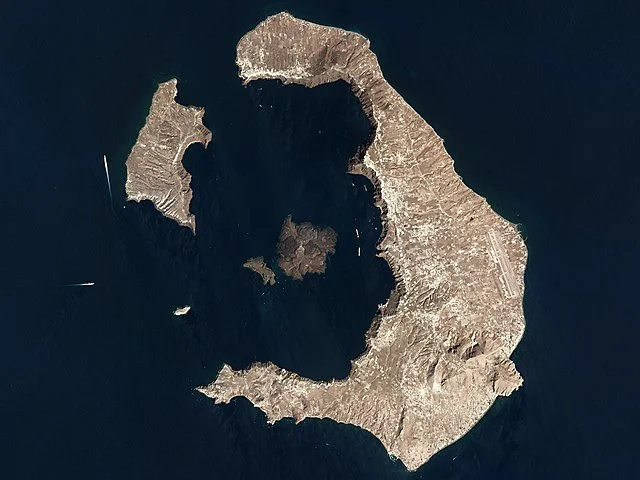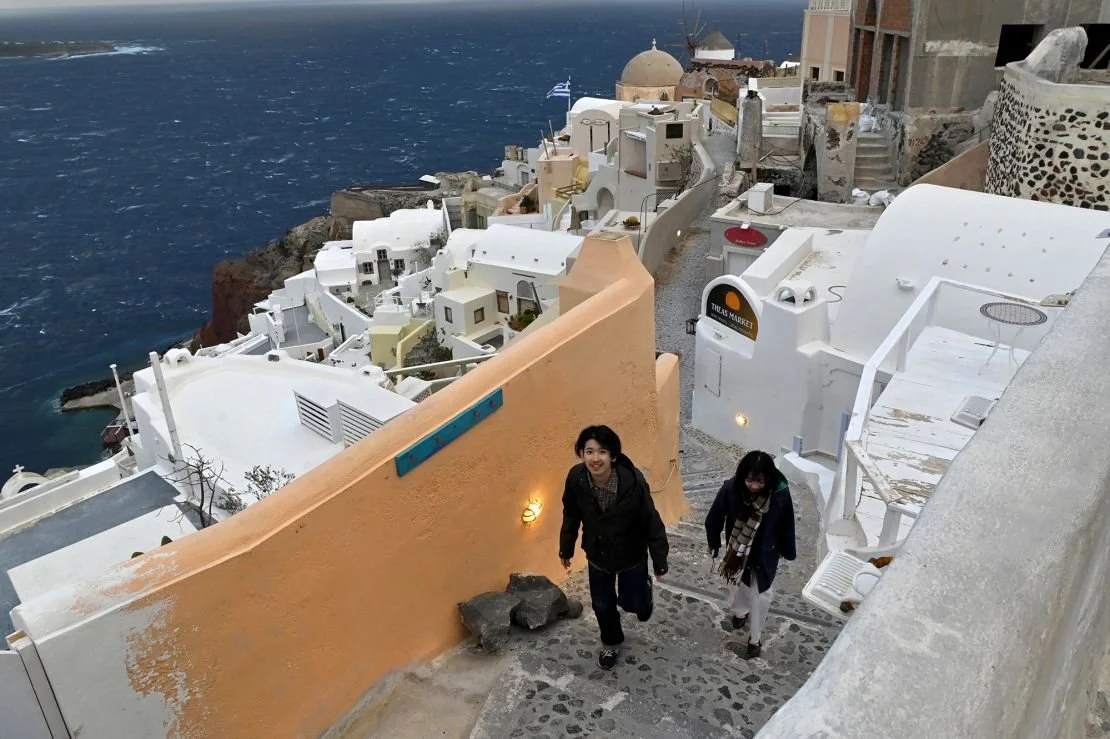A state of emergency has been declared on the Greek island of Santorini as seismic activity persists.
The popular tourist destination, known for its volcanic landscape, has been experiencing an ongoing 'earthquake swarm' that began earlier this month. Since January 31, over 800 tremors measuring at least magnitude 3 have been recorded.
The most powerful quake, a 5.2 magnitude tremor on February 5, was felt as far as Athens, Crete, and parts of Turkey. Experts warn that these tremors could persist for weeks or even months.
Greek Prime Minister Kyriakos Mitsotakis announced a state of emergency last week, set to remain in effect until March 3. He also pledged €3 million to construct an emergency evacuation route in the southern part of the island. “We are preparing for the worst while hoping for the best,” he stated.
Thousands of residents, seasonal workers, and tourists have already left Santorini and nearby islands, including Amorgos, Anafi, and Ios. Over 200 undersea quakes have been recorded in the area, prompting ferry operators and airlines to add extra services to facilitate departures.
If you have a planned trip to Santorini and are considering canceling, here’s what you need to know.
Is a Major Earthquake Likely?
While many of the tremors—some exceeding magnitude 4.5—are not directly linked to Santorini’s volcano, seismologists are unable to determine if the swarm will lead to a larger quake.
Vassilis K. Karastathis, a seismologist at the National Observatory of Athens, stated that there are no clear signs of the seismic activity slowing down. “We are still in the middle of this process,” he explained, noting that no evidence suggests the tremors are nearing an end.
The epicenters of these quakes are concentrated in a growing underwater cluster between Santorini, Anafi, Amorgos, and Ios. While experts consider the undersea location a mitigating factor in reducing potential damage, the frequent tremors have caused concern among locals.
“I’ve never experienced anything like this—an earthquake every 10 or 20 minutes,” said Michalis Gerontakis, a Santorini resident and director of the island’s Philharmonic Orchestra. “Everyone is anxious, even if we try not to show it to avoid panic.”
Hotels Ordered to Drain Pools Amid Seismic Activity
Authorities have advised both residents and visitors to avoid large indoor gatherings, unstable buildings, and areas prone to rockslides.
Hotels on the island have been instructed to drain swimming pools as a precautionary measure, as the movement of large water volumes could impact structural stability in the event of a stronger quake.
The UK’s Foreign, Commonwealth & Development Office (FCDO) has updated its travel guidance for Santorini and Amorgos, echoing the recommendations of the Greek Ministry of Civil Protection.
Authorities have urged people to avoid certain ports—including Amoudi, Armeni, Korfos, and the Old Port in Fira—due to the risk of landslides. Travelers are also advised to stay away from coastal areas immediately following any strong tremor and to follow local emergency directives.
Santorini, a world-renowned tourist hotspot, welcomes over three million visitors annually. Its dramatic whitewashed villages, built along steep volcanic cliffs, create breathtaking scenery but also raise concerns regarding landslides in the event of a powerful quake.
Can You Get a Refund If You Cancel Your Santorini Holiday?
Whether you’re entitled to a refund depends on several factors, including who cancels the trip and for what reason.
“Travelers with upcoming trips to Santorini should first consult their airline or tour operator to understand their options,” advises Ernesto Suarez, CEO of travel insurance provider Gigasure.
If the Greek authorities declare it unsafe to travel and airlines cancel flights, passengers may be entitled to refunds or alternative arrangements. However, since earthquakes fall under ‘natural disasters’—events beyond an airline’s control—compensation may not be available under standard airline policies.
For those with comprehensive travel insurance, coverage may apply if their trip is disrupted, delayed, or canceled due to the earthquake. Policies that include extended travel disruption protection could also cover costs related to alternative accommodations, trip abandonment, or extending one’s stay.
However, if flights and tours are still operating and a traveler chooses to cancel purely out of caution—known as ‘disinclination to travel’—they are unlikely to receive reimbursement. Suarez advises checking policy terms carefully for details on coverage.
Currently, the UK’s FCDO has not issued a ‘do not travel’ warning for Santorini, and Ireland’s Department of Foreign Affairs advises travelers to take ‘normal precautions.’ As long as these advisories remain unchanged, standard travel insurance should remain valid. However, if warnings escalate to ‘avoid non-essential travel’ or ‘do not travel,’ most insurance policies would no longer be applicable.
‘All Possibilities Remain Open’
Greek seismologist Gerasimos Papadopoulos has warned that the ongoing earthquake sequence could signal a larger event.
“The number of tremors has increased, magnitudes have risen, and epicenters have shifted northeast,” he stated. “While these quakes are tectonic and not volcanic, the risk level has increased.”
Local authorities in Santorini’s capital, Fira, have identified designated gathering points in case an evacuation is necessary. However, Mayor Nikos Zorzos has emphasized that these are precautionary steps rather than an indication of imminent danger.
“Taking precautions doesn’t mean an event will happen,” he reassured residents. “Sometimes, the way situations are reported leads to exaggeration—so people should remain calm.”








